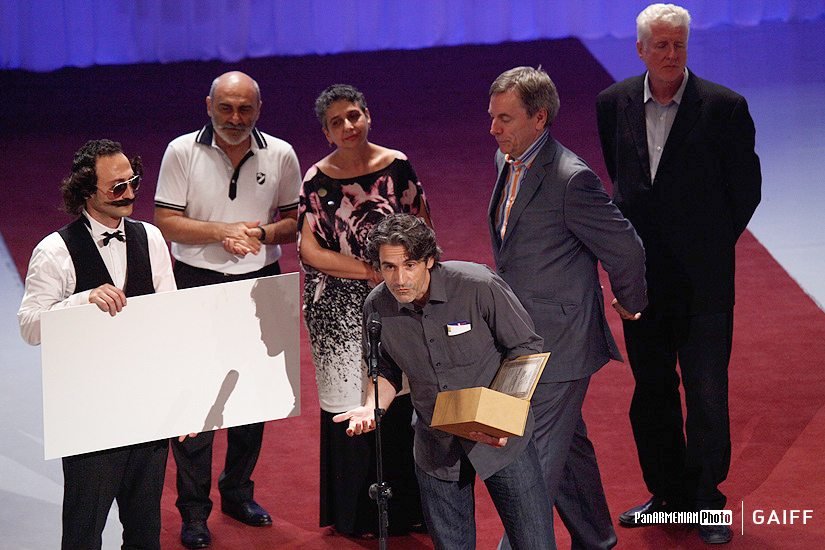YEREVAN (A.W.)—Winners of the annual Golden Apricot International Film Festival were announced on Sat., July 13 at the State Academic Opera and Ballet Theater of Armenia. The Golden and Silver Apricots awards were given to both amateur and renowned filmmakers from Armenia and throughout the world.

The founders of the festival, Harutyun Khachatryan, Susanna Harutyunyan, and Mikayel Stamboltsyan, accepted the Anahit Award by the National Cinema Academy of Armenia. In his opening remarks, Khachatryan said that when the festival started 10 years ago, there were only two competition programs; now they are four: International, Documentary, Armenian Panorama, and Short Films.
Six international juries—including the international cinema critics association FIPRESCI and the Ecumenical Jury—selected the winners from among 200 films. The top prize, the Golden Apricot for Best Feature Film, Went to “Circles,” a film by Srdan Golubovic (Serbia) that tells an emotional story of the post-war legacy in the Balkans. “Circles” is a joint production from Serbia, Germany, France, Croatia, and Slovenia. The Silver Apricot was awarded to Iranian director Majid Barzegar’s “Parviz,” which tells the story of a 50-year-old man who is kicked out of his father’s house because the latter wishes to remarry.
Armenian actor Levon Haftvan plays the role of Parviz. In a special interview to CivilNet, Haftvan said of the role: “I simply didn’t act. That is how I managed to play this difficult role.”
In the Feature competition program, an Honorable Mention with a diploma was awarded to the Turkish film “Araf: Somewhere in Between” by Yesim Ustaoglu. The film is about a love affair between a truck driver and a waitress at a service station in a remote Turkish town. It shows the once-thriving industrial areas in the country that now are faceless areas of economic waste and unemployment.
The Golden Apricot for Best Documentary was awarded to “The Last Black Sea Pirates” by the Bulgarian director Svetoslav Stoyanov. The film is about Captain Jack the Whale and his crew of treasure hunters, whose life starts to fall apart because of tensions and trust conflicts. The Silver Apricot went to the Lebanese film “A World Not Ours,” which tells of the suffering three generations in the Ein el-Hilweh refugee camp in southern Lebanon, by the London-based director Mahdi Fleifel.
In the Armenian Panorama competition, Istanbul-Armenian filmmaker Lusin Dink won the Golden Apricot for her first film, “Saroyanland.” On stage, the niece of the late chief-editor of Agos, Hrant Dink, dedicated the prize to the children of the world. In the same competition, Maria Sahakyan’s “I Am Going to Change My Name” won the Golden Apricot for best Armenian fiction film. Sahakyan’s film’s originality lies in a dream world of images and poetry, where the Armenian landscape also plays a role.
In the Apricot Stone Short Film competition, Leon Prudovsky’s “Welcome and…Our Condolences” won the Golden prize. Three Honorable Mentions went to “The Mother” from Poland, “The Swing of the Coffin Maker” and “Rhino Full Throttle,” both from Germany.
The International Federation of Film Critics, which represents critics and journalists from 50 countries, gave an award to the Iranian documentary “The Last Winter” by Salem Salavati. The British Council also gave special award to Tamara Stepanyan’s film “Embers,” which comes with the opportunity to participate in the 21st Sheffield Documentary Film Festival in the United Kingdom next year.
Special awards were also given to Jivan Avetisyan’s “Broken Childhood” by the Hrant Matevosyan Foundation. Georgian director Rusudan Chkonia’s “Keep Smiling” was awarded the highest prize of the Ecumenical Jury, while Ukrainian director Daria Onyshchenko’s “Eastalgia” received an Honorable Mention.
During the tribute screenings, Golden Apricot celebrated the 110th anniversary of the birth of legendary Armenian composer Aram Khachaturian by screening films to his music. The films of the legendary Armenian film director and scriptwriter Artavazd Peleshyan, as well as of Nerses Hovhannisyan, were also screened during the tribute, marking the directors’ 75th birthdays.
The Golden Apricot is a unique occasion that allows an Armenian audience to become more acquainted with world cinema, through its Yerevan premieres, master classes, and special meetings with world-famous filmmakers such as Istvan Szabo from Hungary, Sergei Loznitsa from Belarus, Pavel Finn from Russia, Godfrey Reggio from the United States, Margarethe von Trotta from Germany, and Ulrich Seidl from Austria.
The closing film of the festival was about Sergey Paradjanov, a true lover of beauty, who was played by French-Armenian actor and director Serge Avedikian. The audience gave standing ovations for the directors, Avedikian and Olena Fetisova. At the end of the awards ceremony, held at the State Academic Opera and Ballet Theater of Armenia, Khachatryan invited Ralph Yirikian, the general manager of the festival’s general sponsor Vivacell-MTS, to announce the closing of a decade of film, and the beginning of a new decade of cinematic festivities in Armenia.


Be the first to comment